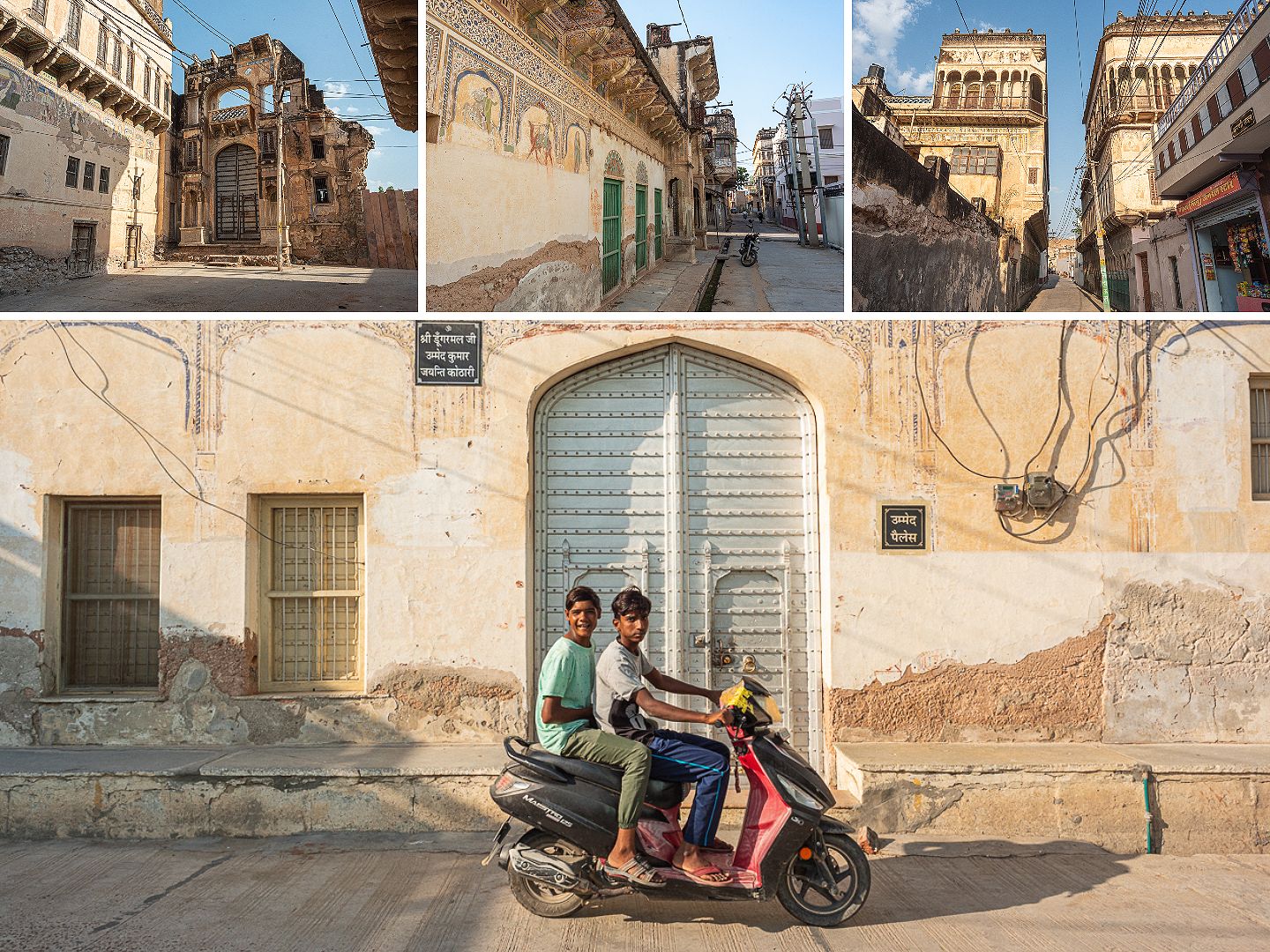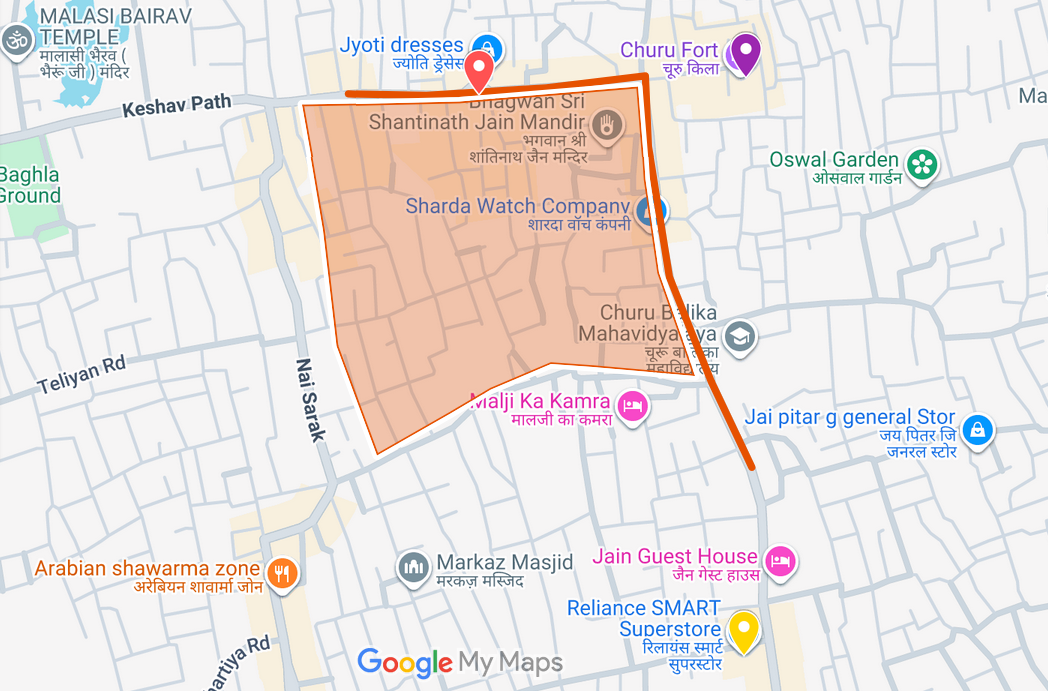
When I was thinking of choosing Churu as my first destination after Delhi, I was completely unsure about whether it was worth going there at all. Let's start with accommodation: on Booking.com, there's only one property, and it's $100 per night...
I prefer paying $150 per 30 nights, lol.
Everything else:

This means there isn't a significant flow of foreigners to Churu, and if that's the case, maybe the city isn't that interesting? That's how I was thinking...
Pictures on Google - well, yes, I saw some mansions with frescoes, but it was completely unclear whether they stand amid average Indian chaos or if there is a cozy old town and so on.
I found a dozen hotels in Churu on the Google maps, and after digging around, I came across a picture of a guesthouse sign with a phone number for booking.
I messaged them on WhatsApp - "how much for a room without AC?" They said 400 rupees. That's how I found Ashirwad Guesthouse.
Guesthouse in Churu
Ashirwad Guesthouse (on Google maps): 400 rupees ($4.5) for a fan room with a shared bathroom, 600 rupees ($6.8) for a room with AC and an attached bathroom. (A US dollar costs 88 Indian rupees in October 2025). With windows facing the corridor - it's common in Rajasthan.
You can contact the guesthouse on WhatsApp: +91 94616 85111
The shared bathroom was okay, but this was pure Indian standard, without a shower, just a bucket with a scoop in the darkish room. Okay, I didn't like this bathroom, despite they cleaned it daily. 😄
The rooms (both 400- and 600-rupee ones) smelled of some chemical so strongly that I was first horrified. 😄 But I aired it out over a day - I think it was some really stinky cleaning agent.
The staff were very kind. I am really thankful for their care and attentive attitude.
Officially, there was no Wi-Fi, but I got access to some network after meeting the right person on the street (Churu is a small town where everyone knows each other). In the end.
The 400-rupee room was new-ish, a firm bed without a blanket, a coffee table, enough space - all okay, I liked the room (not the lack of a shower in the dark bathroom). I stayed for 6 days there because overall it was good, and Churu was irresistible.
The Old Town. How to See Havelis in Churu

The area on the Google Maps
The main attraction of the city is the havelis - mansions of wealthy merchants from the 19th to early 20th centuries.
To help you get oriented on where to look, where to check info, and panoramas on Google Maps, I'll show the area: the orange shape on the map, 600x600 meters, is where the density of havelis reaches its maximum - entire blocks covered in frescoes. (But there are havelis in the surrounding areas either.)
Many epic havelis aren't even marked on Google Maps! I advise spending the whole day there, visiting each alley. You can choose this gate (Google Maps) as a start point - look at Google panorama with it.
I marked Churu Fort (the purple pin) which is curious to see and visit, though it's just a place with a police station in it, nothing that special.
Another landmark is the White Clock Tower, marked in red on my map. The red line is Gudri Bazar Street and "Clock Tower Street" (where the colorful market is located!) - I couldn't figure out what this street is called on Google Maps.
I also marked the Reliance SMART Superstore (a yellow pin) - a large modern hypermarket can be useful.
It isn't that easy to find a good place to eat in Churu if you aren't local and have no motorbike. I loved Papa Veg Pizza (link) since I could be in peace there - a modern-like clean place and nobody stared at me. I always eat Indian food, so pizza was good for a change - 120 rupees, real mozzarella but with some mayo :( Okay, that's not Italy.
They had a hole-in-the-wall Indian restaurant at this area - 100 rupees for small dahl and big naan with butter - tasty.
A Walk in the Haveli Area (the Orange Shape on My Map)
I'll show photos from my third walk around Churu (on October 11, 2025) to give an overall picture. The photos show only a small number of the havelis - I wasn't trying to give a complete list or a top, just wanted to convey the general atmosphere.
There are many havelis with frescoes in Churu, and they are in very different conditions. But most, as you'll see, are in a state of decay, which adds extra charm to walking around these places.
Another feature of the haveli area in Churu is that there are very few people! You can come here just to take a break from crowds and unwanted attention.
Of course, there are still some people here - mostly passing by on motorbikes, and sometimes teenagers going to or coming back from school.
Sometimes you'll also see cows and zebu in the alleys, of course.
Look at this empty space - isn't it a luxury in India? Let's get closer to those gates:
You often can't get inside the havelis - often locked or locals ask money to enter the property (a couple of times happened to me). But this one was open. A low door... what's inside?
First thought - what if there are dogs...
Yes, about dogs - in Churu there are a lot of them, and in the haveli area (the orange shape on the custom map) there are fewer 👍 Luckily, during daylight they all just lie around and don't move.
Here's the courtyard. A boy scuffled past, a woman flashed by in a window - no one else.
An amazing open-air museum!
On the right, a new extension of some sort, either residential or utility. (Further on, even a balcony with laundry hanging out.)
A door, and on the right - someone's bag.
Let's leave before someone asks for money for a “ticket,” lol.
If you think this emptiness is because of the blazing sun - no. This is late afternoon, around 4 p.m., in October, there are quite comfortable temperatures, around 30°C. At night, it's about 22°C.
Havelis are sometimes like castles, and sometimes more like this building - just a beautiful townhouse with frescoes.
I thought all of Rajasthan was decorated with havelis like these. But now, writing from Bikaner, I can say - the havelis here are completely different. In Bikaner, they use a lot of amazing wood carving, and almost no frescoes.
But something similar exists in the nearby town of Mandawa - everyone recommended it when I was in Churu. One knowledgeable person also mentioned Ratangarh and Fatehpur; these are three towns about 50 km from Churu, showcasing the same painted haveli culture.
Outside this historic area with empty streets, it's ordinary India with crowds of people, and since foreigners in Churu are rare, everyone notices you.
How do you like this open-air gallery?
Here the frescoes are almost gone - look at this wonderful steamboat.
Cars from the early 20th century - stunning, isn't it? Here they are:
Fading into oblivion :(
Even more walls like this in Churu with multiple holes - traces of frescoes worn down by the relentless passage of time.
A gallery of portraits, also fading away...
I am truly proud of myself for finding this place and daring to go there - a case when you go against the usual ideas of where to travel and what to see, and you get a reward you couldn't even dream of. 10 out of 10, an amazing city.
Check out my other posts from Churu:
- Frescoes of Rajasthani Mansions (Havelis) in Churu, India
- Churu, India: A Hidden Gem of Rajasthan. People And Mansions
- Wednesday Walk in Churu, India
The photos were taken with a Nikkor 24mm f/2.8D on a full-frame DSLR Nikon D750 in October 11, 2025, in Churu, Rajasthan, India.